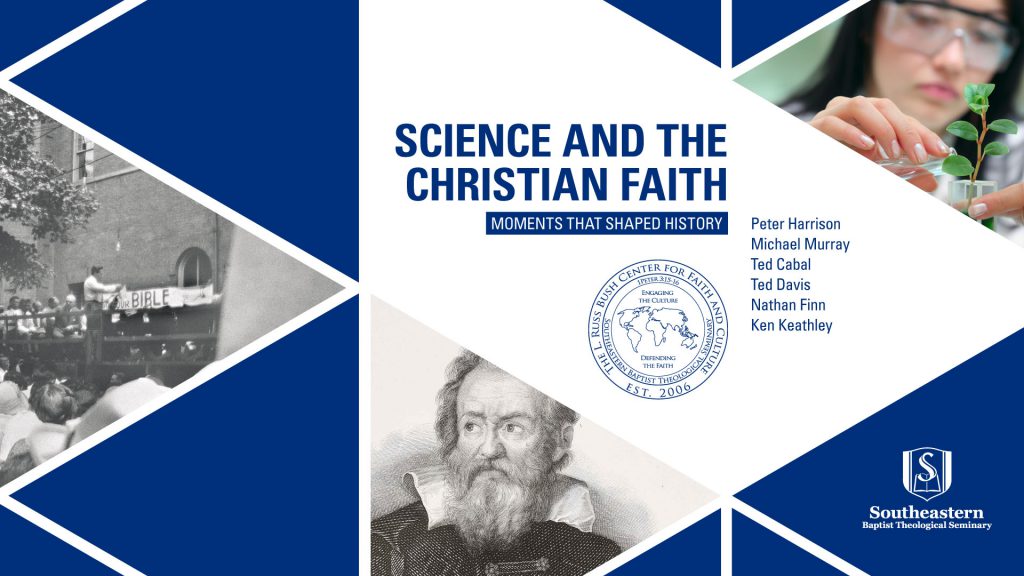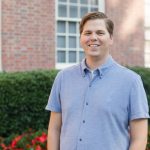In less than a month (Feb. 21-22), the L. Russ Bush Center for Faith and Culture at Southeastern Seminary will host “Science and the Christian Faith: Moments That Shaped History.”
The genesis of this conference was simple. Science and faith have a long, complex, and storied relationship. But we believe that better understanding the past can help us better navigate the future.
I’m immensely excited for this conference. Let me tell you why:
1. Everyday Christians have questions about faith and science.
Maybe you think questions of science and faith are relegated to academia. But I’m a pastor of a small rural church, and you’d be surprised how often I hear questions about faith and science. Sometimes these questions emerge during Bible study conversations or small group settings. More often, though, church members ask me these questions in private conversations. “How do we reconcile what scientists have observed about the age of the earth with what we read in Genesis?” asked one man.
I answer these questions the best I can. But every time I field such questions, I am reminded that everyday Christians are thinking about these topics. They want to know how to navigate the intersection of faith and science, and we need to be equipped to hear and answer their questions with confidence.
So, I’m looking forward to “Science and the Christian Faith” because I want to better understand these topics for myself — so I then can have more informed conversations with my church members. We do our people a disserve if we willfully remain uninformed on topics they have questions about.
2. The conference features an eclectic lineup of speakers and topics.
Some kinds of conferences feature a lineup of scientists. Other kinds of conferences feature theologians or historians. How often do you get the chance attend a conference with all three? “Science and the Christian Faith” is one of those rare opportunities in which scholars from multiple disciplines come together to offer their perspectives on this topic.
Here’s a preview of who’s coming:
- Dr. Peter Harrison – an Australian Laureate Fellow and Director of the Institute for Advanced Studies in the Humanities at the University of Queensland
- Dr. Michael Murray — President of the Arthur Vining Davis Foundation
- Dr. Ted Cabal — Professor of Philosophy and Apologetics at the Southern Baptist Theological Seminary
- Dr. Ted Davis — Distinguished Professor of the History of Science at Messiah College
- Dr. Nathan Finn — Provost and Dean of Faculty at North Greenville University
- Dr. Ken Keathley — Senior Professor of Theology at Southeastern Baptist Theological Seminary
The speaker lineup is eclectic, and so are the the lecture topics:
- “The Christian Origins of Modern Science”
- “The Aquinas Appropriation”
- “The Galileo Affair”
- “The Scopes Monkey Trial”
- “Southern Baptists and Evolution”
This conference truly is one-of-a-kind — both in the speakers who are coming and the topics they plan to address.
3. Did I mention the perks?
When you attend “Science and the Christian Faith,” you’ll not only enjoy eye-opening conversation from gifted scholars. You’ll also get to enjoy a delicious banquet meal on Saturday, Feb. 21. Plus, every attendee will receive a free book.
But it’s not just about food and free stuff. When you attend “Science and the Christian Faith,” you’ll get to meet hundreds of other like-minded attendees who are also asking these same questions. As you gather around a table or mingle after a conference session, perhaps an acquaintance will become a friend.
As you can tell, I’m excited about “Science and the Christian Faith.” What parts of the conference excite you? Let us know in the comments.
Learn more about
“Science and the Christian Faith: Moments That Shaped History.“





Comments and Pingbacks
2020-01-24 09:43:34
#FaithandCulture Reading: Anti-Semitism, the Gig Economy, Teaching Kids About Racism | Intersect
[…] 3 Reasons You Should Attend âScience and the Christian Faith: Moments That Shaped HistoryâNathaniel Williams: “We do our people a disserve if we willfully remain uninformed on topics they have questions about.” […]